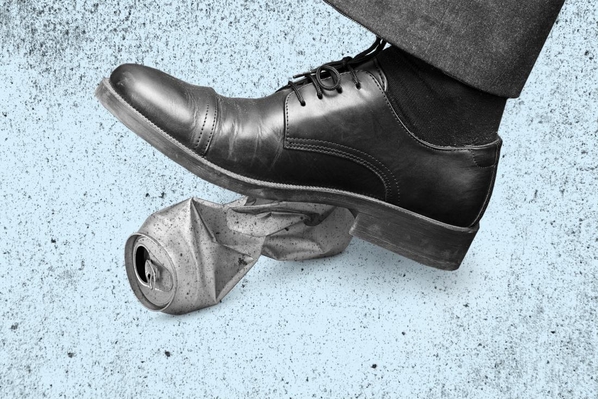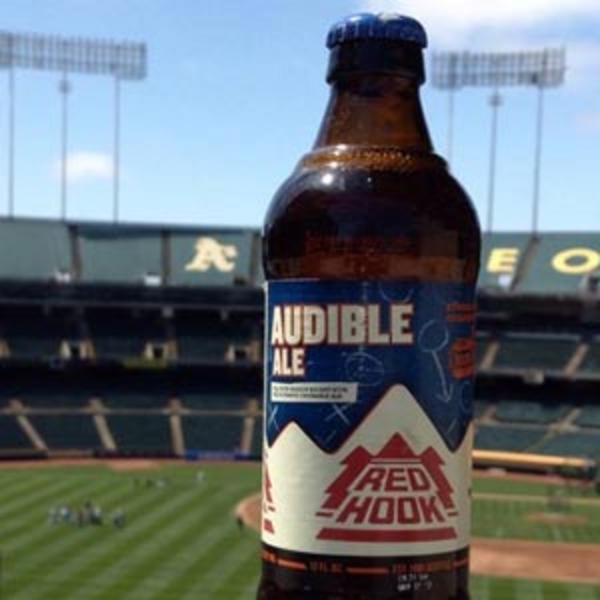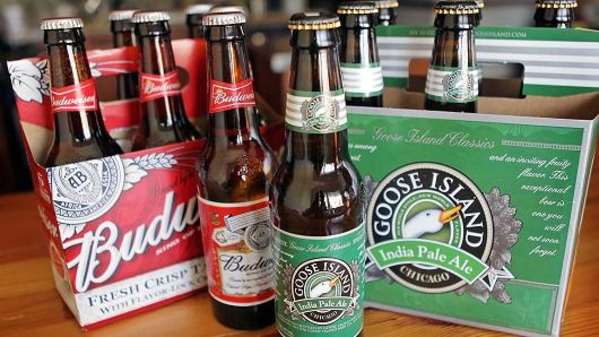Global brewers out to crush 'pesky' micros
Added: Thursday, December 24th 2015

The global brewers are on the march. The sale of the Camden Town Brewery to AB InBev, the world’s biggest brewer, is part of a strategy to dominate the craft beer sector -- the only growing and dynamic element of the beer business in such long-established markets as Britain and the United States.
Writing in the online American journal Money, Brad Tuttle says: “Big Beer’s strategy is to put the pesky craft category in its place – or even destroy it, if possible. Craft’s portion of overall sales has doubled over the past five years while ‘macro’ beers like Budweiser and Miller have gone flat or declined.”
When AB InBev’s merger with SABMiller is complete, the new corporation will control 30 per cent of world beer production. All the accumulated evidence indicates it will use this awesome power to grow sales in the emerging markets of Africa, China, and Russia and the Baltic States. In its long-established markets, it will expand its marketing and distribution to grow its own sales and push aside independent brewers.
Global brewers have been investing in and or taking over craft breweries in the U.S. for several years. Anheuser-Busch, the American arm of AB InBev, has been in the vanguard of this activity as it has seen sales of its main brand, Budweiser, declining for close on 25 years. At the same time, the craft sector has blossomed, with some 4,000 breweries and a combined market share of around 10%. In a country with a population of close to 320 million, that’s a large amount of beer.
In the U.S., “craft beer” is defined by the brewing industry as a brewery that produces less than six million barrels of beer a year. There is no similar definition in the UK.
Grim roll-call
Redhook Brewery was an early member of the craft sector. When I visited in the late 1990s, I was taken from its original site in a former trolley shed in Seattle to a new and much bigger plant being built outside the city, close to Bill Gates’ mansion. Anheuser-Busch has since taken a 35% stake in Redhook and its sales have gone national. Redhook formed the Craft Brew Alliance with Kona and Widmer and AB now has 35% stakes in all three breweries. In spite of their self-styled craft status, they are not allowed to be members of the Brewers’ Association, which represents genuine, independent American craft brewers.
In 2011, AB bought Goose Island in Chicago for $38.3 million. The original plant continues to produce a range of excellent beers, some Belgian-inspired, along with the stand-out Bourbon County Stout aged in whiskey barrels. But AB has built what it calls a new “facility” at Baldwinsville In New York State where it brews the main Goose Island beers, IPA, Honkers Ale and 312 Wheat Ale. IPA is also brewed at the AB brewery in Fort Collins, Colorado, and at two Labatt's plants in Canada.
In the Toronto Star, Josh Rubin spoke to Suzanne Wolcott of Goose Island, who has worked for the company since before the AB takeover. She says the IPA recipe has changed as hop variety change from year to year. Wolcott added that the beer had been adapted to be brewed in bigger vessels. "Tank geometry is huge [at Labatts]," she said, "and ingredients behave differently."
The original yeast culture used at Chicago for IPA -- imported from Europe to give the beer a true IPA character -- has been replaced by a culture best suited to big fermentation tanks. In Chicago, water was drawn from Lake Michigan and carbon filtered. Malts were a blend of American and European varieties while the hops were American Cascade and Mount Hood blended with Czech Saaz and Styrian Goldings. AB will not Czech Saaz as it will not buy from the Czech Republic as a result of the trademark dispute with the Budweiser Budvar brewery there. It is using Saaz in Goose IPA but they are grown -- along with Amarillo, Cascade and Mount Hood -- on AB's 1,700 acre Elk Mountain Farms in Idaho, 10 miles from the Canadian border. As with all things AB InBev, Elk Mountain is the biggest hop farm in the United States.
When beer writer Matthew Curtis visited AB's Fort Collins brewery, he was less than impressed with the Goose IPA he was served: http://www.totalales.co.uk/blog/talales.co.uk/2015/01/the-fall-of-goose-island.html
The beers are now branded simply Goose and are widely promoted and advertised. I thought the IPA was one of the finest new wave interpretations of the style but recent tastings have been less impressive.
Magic Hat Brewing in Vermont boasts that it makes “the best tasting beers on the planet” but made the classic mistake of getting too big for its fedora. It bought another American craft brewery, Pyramid, and was quickly swallowed by North American Breweries. This corporation owns Labatt of Canada but is part of a Costa Rica company called – confusingly – Florida Ice and Farm.
Leinenkugel in Wisconsin was a proud family brewery, founded in Wisconsin in 1867. But, as Peroni and countless other families have proved, the big cheque book has its attractions and Leinenkugel – which survived Prohibition by producing a near-beer called Leino -- is now owned by SABMiller.
Lagunitas in California is now 50% owned by Heineken International while AB has gone on the rampage and now owns 10 Barrel Brewing, Blue Point Brewing, Elysian Brewing, Four Peaks Brewing, and Golden Road. AB also has stakes ranging from 30 to 40% in Fordham and Dominion Brewing and Founders Brewing.
Mendocino Brewing in California, another early pioneer of craft brewing, has been owned by United Breweries since the late 1980s. UB is a giant Indian company with a more than 40% share of its local beer market, with interests in aviation, distilling and fertilisers.
Portland Brewing/MacTarnahan’s is now part of North American Breweries while Saint Amber Brewing is owned by Miller Coors.
Shock Tap Brewing shows clearly how the global brewers are taking the craft beer threat. This is a wholly-owned company created by Anheuser-Busch that produces beers designed to create the impression of being craft products.

Distribution arm-lock
In the U.S., brewers are not allowed to own retail outlets – there is no equivalent of the British “tied house” system. When Prohibition was lifted in 1933, new laws banned brewers from both making and retailing beer. (The law has been relaxed in some states in order to allow the spread of brewpubs.) Big brewers in the U.S. neatly sidestep the restrictions by “loan tying” bars with loans and discounts on sales. More importantly, the giant brewers own or control the truck companies that distribute beer throughout the vast country.
The enormous profits made from beer distribution can be seen most vividly in the case of Cindy Lou McCain, née Hensley, the wife of Republican senator and former presidential candidate John McCain. She inherited a distribution company founded by her father that trunks AB beers around the country. She is estimated to have a fortune of $100 million – not exactly small beer.
McCain’s and other big distribution companies, in league with the big brewers they represent, can determine which beers get on the trucks and can lock out smaller independent producers. According to Brad Tuttle at Money, the giant brewers are buying up distribution companies in order to intensify the arm-lock on craft brewers. As a result, craft brewers are restricted to their localities and can’t gain national distribution.
The British system is different but global and national brewers are increasing their domination by using distribution companies. The biggest is TradeTeam, which was set up by Bass Brewers to trunk its products round the country. When Bass quit brewing in 2000, ownership of TradeTeam passed to Molson Coors. MC has now sold the company to DHL, which has 29 sites, 450 vehicles and 1,700 staff. It makes 20,000 deliveries a week to pubs, clubs, restaurants and retailers.
National pub companies such as Enterprise, Punch and Mitchells & Butlers can cherry pick the beers they supply to their pubs and they choose in the main big brands from brewers with whom they have discount deals. But SIBA – the Society of Independent Brewers – has its own highly effective service called Beerflex that supplies its members’ beers to pubs. Brewers with tied estates make their own direct deliveries while in eastern England the East Anglian Brewers Cooperative makes one-truck deliveries of beers from all its members.

Distorting the market
In both the U.S. and the UK, global and national brewers can further distort the market by selling their products far more cheaply than smaller brewers. Sam Calagione of Dogfish Head Brewery in Delaware says: “The larger companies have the power to manipulate markets. Corporate brewers sell craft-like ales below the cost of true craft beer to push them off a tap line”.
A powerful example of this can be seen in the case of Lagunitas, the California brewery that has sold half its business to Heineken International. Lagunitas IPA (6.2%) is now widely available throughout Britain in most major supermarkets and Majestic Wine stores.
Priced as low as £1.65 a bottle in Morrisons, this is a marginal profit product. A bottle of the 6% IPA produced by the London craft brewer Anspach & Hobday costs £3.50. But the speed with which the Lagunitas beer is moving off shelves shows that it can chalk up healthy income even at marginal cost.
Molson Coors say it makes only around 1p a pint profit from sales of Carling but if you are brewing some two million barrels a year that mounts up to a lot of pennies. Craft brewers making small volumes of beer cannot cut prices and make a decent return, especially when they use the finest and therefore most expensive raw materials.
“Passion is lost”
Carol Stoudt, who founded Stoudt Brewing in Adamstown, Pennsylvania, with her husband Ed in 1987 and is one of the most respected craft brewers in the U.S., says: “Passion is lost when people running a brewery don’t have ownership, then quality suffers.”
Quality also suffers when cheaper raw materials are used. In the 1980s, when Grand Metropolitan, owner of Watney Mann & Truman Breweries, bought the revered family Ruddles Brewery, a senior brewer told me GrandMet told him how to make beer cheaper and faster: fermentation could be speeded up by using industrial enzymes, he was instructed.
Nothing changes. AB InBev is a Belgian, American and Brazilian conglomerate but it’s the Brazilians who call the shots. They are known as ruthless cost-cutters and centralisers. Jasper Cuppaidge, founder of Camden, may say he will maintain the quality and integrity of his beers, but the accountants at AB InBev may have other ideas.
AB InBev’s main brand, Budweiser, lists rice before barley malt on its label. Global brewers use rice and maize and prefer hop oil to whole flower hops. The term “lagering” or ageing has no meaning for them: most global lager brands now have a 21-day brewing cycle, identical to ale’s. The watchwords are “brew it fast and move it out.”
Who next in the firing line?
Meantime Brewery in Greenwich is “in play” as they say in the City. It was bought by SABMiller earlier this year but AB InBev says it will offload it along with Grolsch and Peroni. Heineken or Carlsberg could be possible suitors: it’s a snip at £80 million.
It would be idle to speculate about other possible UK targets but it’s clear that the global brewers are looking to gobble up successful craft brewers and extend their market domination.
The best advice to Britain’s craft brewers is to batten down the hatches and repel boarders who arrive with big cheque books.







